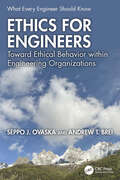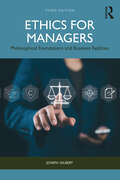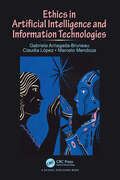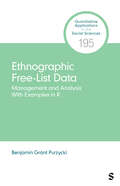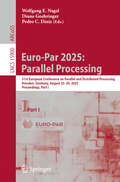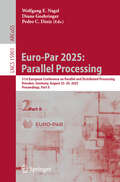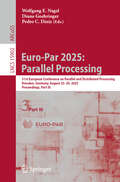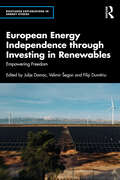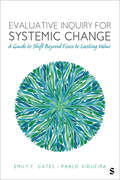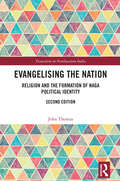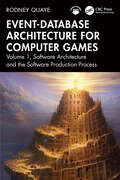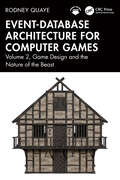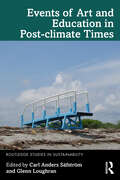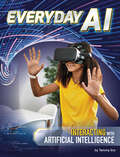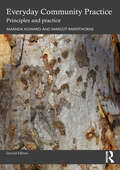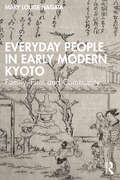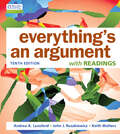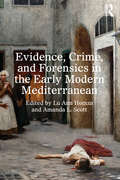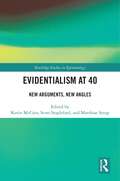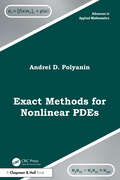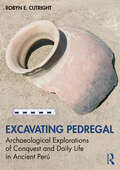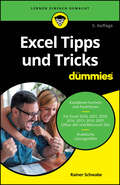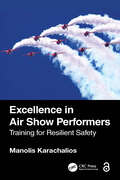- Table View
- List View
Ethics for Engineers: Toward Ethical Behavior within Engineering Organizations (What Every Engineer Should Know)
by Seppo J. Ovaska Andrew T. BreiEthics for Engineers: Toward Ethical Behavior within Engineering Organizations offers a multilevel perspective on engineering ethics with considerable breadth and depth, making it a valuable resource for students, educators, and professionals alike.This pragmatic book contains case studies of micro-level ethical violations, evaluating their moral implications and discussing moral self-licensing behind making unethical decisions. It also explores macro-level cases that have caused significant reputational and financial damage to major companies. In addition, the authors touch on topics whose overall impact is not yet fully understood, such as environmental ethics issues related to wind turbine blades and space debris management. By presenting examples from different levels and offering reflections from various perspectives, this text prompts readers to critically evaluate the ethical implications of their actions and understand what may drive a work community to behave unethically.Key features: Covers both moral theoretical and behavioral ethics perspectives. Contains day-to-day micro-level cases from the lives of practicing engineers, supplemented with macro-level cases. Provides pragmatic guidance for individual engineers and their organizations to move toward value-based ethics. Features colloquial language to make the book an enjoyable and accessible read. Includes 29 demonstrative vignettes, 87 class exercises, and an insightful interview with an ethics ambassador. This unique text serves as a pedagogically sound learning companion for courses in engineering ethics and related topics, striking a balance between research-based findings (with over 40 scholarly references) and real-world experiences (featuring an Appendix by an industry executive).
Ethics for Managers: Philosophical Foundations and Business Realities
by Joseph GilbertEthics for Managers introduces students to the philosophical underpinnings of business ethics and translates this theory into practical terms, demonstrating the moral implications of the decisions managers make. It explains the decision-making processes and constraints that managers face, regardless of their level or function. It then proceeds to show how to identify and analyze the ethical aspects of these decisions.This third edition features updated examples and references throughout. It contains new material on managing employees working from home, increased emphasis on the pattern aspects of individual decisions and on the systemic constraints that affect managers’ decisions. There is a completely new chapter on artificial intelligence. This chapter explains at a basic level what artificial intelligence is, and examines its impact on decisions concerning the hiring, monitoring, evaluating, profiling and termination of employees.Student-friendly features include learning objectives at the beginning of each chapter, examples that demonstrate real-world business decisions, and end of chapter discussion questions. These discussion questions provide opportunities for applying chapter materials to actual decisions and can stimulate class discussion or serve as test questions. Students will find this compact, well-organized text a useful tool for understanding ethics in the digital age.
Ethics in Artificial Intelligence and Information Technologies
by Marcelo Mendoza Gabriela Arriagada-Bruneau Claudia LópezThis book addresses the challenges posed by adopting and developing new AI technologies and how they impact people. Ethics, the scope, and the impact of technology on people are vital. The book starts with the ethical aspects of AI, presenting a socio-technical approach to integrating Ethics into AI projects, and outlines perspectives around feminism, sustainability, and labor transformation. Next, the concepts of fairness, accountability, and transparency are introduced, discussing their implications for developing information systems such as recommender systems, including aspects related to data privacy. Then the book covers the relevance of natural language processing systems, highlighting debias strategies and evaluation methodologies. The scopes of fairness-based approaches for ChatGPT and other generative text models are also introduced. Finally, advanced topics that include the relationship between AI and disinformation are addressed, including a discussion of the scope of news-generative models such as deep fakes. The book ends with a discussion of the perspectives and challenges in the area.The book is meant for an audience of advanced undergraduate and graduate students from all disciplines related to information systems. It is also helpful for researchers and practitioners interested in the subject.
Ethnographic Free-List Data: Management and Analysis With Examples in R (Quantitative Applications in the Social Sciences)
by Benjamin Grant PurzyckiEthnographic Free-List Data: Management and Analysis With Examples in R details a method that involves research participants listing what they know or think about the researcher’s topic of interest. While researchers typically report these free-list analyses in isolation, this book incorporates them with other analytical methods and demonstrates how ethnographic free-lists can be useful to a broad social science audience. The first half of the book covers descriptive methods, and the second half incorporates insights from the early chapters into a predictive statistical framework. Author Benjamin Grant Purzycki explains how to collect, clean, and manage free-list data and how to use R to calculate and visualize the data.
Ethnographic Free-List Data: Management and Analysis With Examples in R (Quantitative Applications in the Social Sciences)
by Benjamin Grant PurzyckiEthnographic Free-List Data: Management and Analysis With Examples in R details a method that involves research participants listing what they know or think about the researcher’s topic of interest. While researchers typically report these free-list analyses in isolation, this book incorporates them with other analytical methods and demonstrates how ethnographic free-lists can be useful to a broad social science audience. The first half of the book covers descriptive methods, and the second half incorporates insights from the early chapters into a predictive statistical framework. Author Benjamin Grant Purzycki explains how to collect, clean, and manage free-list data and how to use R to calculate and visualize the data.
Euro-Par 2025: 31st European Conference on Parallel and Distributed Processing, Dresden, Germany, August 25–29, 2025, Proceedings, Part I (Lecture Notes in Computer Science #15900)
by Pedro C. Diniz Wolfgang E. Nagel Diana GoehringerThe three-volume set LNCS 15900-15902 constitutes the proceedings of the 31st European Conference on Parallel and Distributed Processing, Euro-Par 2025, which took place in Dresden, Germany, during August 25–29, 2025. The 78 papers included in these proceedings were carefully reviewed and selected from 264 submissions. They were organized in topical sections as follows: Part I: Programming, compilers and performance; scheduling, resource management, cloud, edge computing, and workflows; Part II: Architectures and accelerators; data analytics, AI, and computational science; Part III: Theory and algorithms; multidisciplinary, domain-sepcific and applied parallel and distributed computing.
Euro-Par 2025: 31st European Conference on Parallel and Distributed Processing, Dresden, Germany, August 25–29, 2025, Proceedings, Part II (Lecture Notes in Computer Science #15901)
by Pedro C. Diniz Wolfgang E. Nagel Diana GoehringerThe three-volume set LNCS 15900-15902 constitutes the proceedings of the 31st European Conference on Parallel and Distributed Processing, Euro-Par 2025, which took place in Dresden, Germany, during August 25–29, 2025. The 78 papers included in these proceedings were carefully reviewed and selected from 264 submissions. They were organized in topical sections as follows: Part I: Programming, compilers and performance; scheduling, resource management, cloud, edge computing, and workflows; Part II: Architectures and accelerators; data analytics, AI, and computational science; Part III: Theory and algorithms; multidisciplinary, domain-specific and applied parallel and distributed computing.
Euro-Par 2025: 31st European Conference on Parallel and Distributed Processing, Dresden, Germany, August 25–29, 2025, Proceedings, Part III (Lecture Notes in Computer Science #15902)
by Pedro C. Diniz Wolfgang E. Nagel Diana GoehringerThe three-volume set LNCS 15900-15902 constitutes the proceedings of the 31st European Conference on Parallel and Distributed Processing, Euro-Par 2025, which took place in Dresden, Germany, during August 25–29, 2025. The 78 papers included in these proceedings were carefully reviewed and selected from 264 submissions. They were organized in topical sections as follows: Part I: Programming, compilers and performance; scheduling, resource management, cloud, edge computing, and workflows; Part II: Architectures and accelerators; data analytics, AI, and computational science; Part III: Theory and algorithms; multidisciplinary, domain-specific and applied parallel and distributed computing.
European Energy Independence through Investing in Renewables: Empowering Freedom (Routledge Explorations in Energy Studies)
by Julije Domac Velimir Šegon Filip DumitriuThis book delves into Europe’s urgent quest for energy independence as a foundation for the EU and national sovereignty, economic resilience and climate leadership. Amid the rising geopolitical tensions and accelerating climate crises, it advocates for a bold shift towards renewable energy investments as a pathway to a sustainable, energy-secure future.Offering an in-depth exploration of policy innovations, strategic imperatives and case studies, the book highlights how decentralized energy systems and local empowerment can drive resilience and self-reliance. It underscores Europe’s potential to lead the global renewable energy transition, serving as a blueprint for other regions tackling energy insecurity and climate change. The book demonstrates how the EU and its nations can simultaneously enhance energy security and achieve their climate goals through strategic investment in renewables.The book is designed for policymakers, academics and energy professionals, particularly those involved in European energy, climate and economic strategies. It is also an essential resource for university professors and researchers in energy policy, international relations, sustainability and European studies. Regional and local leaders will find valuable insights on implementing transformative energy solutions tailored to their communities.
Evaluative Inquiry for Systemic Change: A Guide to Shift Beyond Fixes to Lasting Value
by Emily F. Gates Pablo VidueiraIn a world where social, ecological, health, and other problems are influenced by multiple, intersecting systems, why do most interventions target single-factor solutions? Why does so much evaluation settle for incremental change, and how could it contribute instead to deeper, lasting, transformative change? Authors Emily F. Gates and Pablo Vidueira make two interconnected arguments in this book: they critique the "fixed" approach of traditional program evaluation and policy analysis, and they advance an alternative approach centered on changing systems and developing the value of efforts toward change. They demonstrate that systemic change that embeds evaluative inquiry is a theoretically supported, practical way to work toward fundamental social change with lasting impact.
Evangelising the Nation: Religion and the Formation of Naga Political Identity (Transition in Northeastern India)
by John ThomasEvangelising the Nation examines the extent to which a particular articulation of Christianity mediated the formation of national identity among the Nagas who inhabit the hill tracts between the Brahmaputra River in India and the Chindwin River in Burma (now Myanmar). This revised second edition revisits the defining attributes of this process and brings to forefront the agential role of religion in shaping modern political identities.This book, based on meticulous archival research, tracks the transmutations of Protestantism from the United States to the hill tracts of Northeast India, and its impact on the form and content of the nation that was imagined and longed for by the Nagas. It also examines how missionaries, local church leaders, and the colonial and post-colonial state mediated nationalist aspirations among the Nagas during the twentieth century.Part of Transitions in Northeastern India series, this lucidly written book will be of interest to scholars and researchers of South Asian history, religion, political science, sociology and social anthropology, and particularly those concerned with Northeast India.
Event-Database Architecture for Computer Games: Volume 1, Software Architecture and the Software Production Process
by Rodney QuayeEvent-Database Architecture for Computer Games proposes the first explicit software architecture for game development, answering the problem of building modern Computer Games with little or no game design. An archetypal software production process, based on this architecture, is also introduced.This volume begins by describing the formal definition of software production processes in general and the production process of Computer Games in particular. It introduces the two basic principles behind the software architecture that addresses the communication and productivity problems of a degenerative production process. It goes on to describe the archetypal software production process and outlines the role that the Game Designers, Game Programmers, Game Artists, Sound Designers and Game Testers play in that process.This book will be of great interest to professional game developers involved in programming roles, such as Tools Programmers, UI Programmers, Gameplay Programmers and Engineers, as well as students studying game development and programming.Rodney Quaye is Senior Software Development Engineer in Test at Build A Rocket Boy. He has worked in the Computer Games industry for over 16 years. He has worked at several Games Studios including Sumo Digital, nDreams, Supermassive Games, Traveller’s Tales, Hotgen, Oysterworld, Second Impact, Flaming Pumpkin, Goldhawk Interactive, Jagex, Gusto Games, Criterion, Asylum Entertainment, Codemasters and Deibus Studios. The famous titles he has worked on include Burnout 2 and 3 for Criterion, LMA Manager for Codemasters, Runescape for Jagex, Lego Worlds for Traveller’s Tales, and Everywhere for Build A Rocket Boy.
Event-Database Architecture for Computer Games: Volume 2, Game Design and the Nature of the Beast
by Rodney QuayeEvent-Database Architecture for Computer Games proposes the first explicit software architecture for game development, answering the problem of building modern computer games with little or no game design. In this volume, an example of a practical production process based on the software production process is explained, including examples of the game design, technical design, data design and tools design in that process.This volume includes a brief overview on how to optimise the results. This leads on to an exploration of how staff, especially Software Engineers, typically view optimisation. It also explains how the vision of the Engineers relates to the vision of the leadership of a project or company. It describes how this leadership can also affect the efficacy of a production process, including the Event-Database Production Process.This book will be of great interest to professional game developers involved in management roles such as Technical Directors and Game Producers and technical roles, such as Tools Programmers, UI Programmers, Gameplay Programmers and Engineers, as well as students studying game development and programming.Rodney Quaye is Senior Software Development Engineer in Test at Build A Rocket Boy. He has worked in the Computer Games industry for over 16 years. He has worked at several Games Studios, including Sumo Digital, nDreams, Supermassive Games, Traveller’s Tales, Hotgen, Oysterworld, Second Impact, Flaming Pumpkin, Goldhawk Interactive, Jagex, Gusto Games, Criterion, Asylum Entertainment, Codemasters and Deibus Studios. The famous titles he has worked on include Burnout 2 and 3 for Criterion, LMA Manager for Codemasters, Runescape for Jagex, Lego Worlds for Traveller’s Tales and Everywhere for Build A Rocket Boy.
Events of Art and Education in Post-climate Times (Routledge Studies in Sustainability)
by Carl Anders SäfströmThis book concerns the urgency of thinking and acting in response to climate change through art and education. While both fields are often connected through disciplinary dialogues, climate change prompts a greater need to unite artists and educators around common environmental problems and goals.By staging transcritical engagements, this book draws out common and uncommon disciplinary perspectives that can generate new ways of thinking, living, and doing in the Anthropocene. Ideas around courage, resilience, life, and death emerge. An expression of active, non-violent resistance to the ongoing destruction of our planet, this book supports imaginative action, popular sovereignty, and the courage to live well within the challenges of our era. Engaging artists’ and educators’ questions, it maps significant differences and potential intersections for further enquiry.Events of Art and Education in Post-climate Times will be helpful for students studying art, education, environment, sustainability, and climate change. It will also interest researchers, practising artists, and teachers in these disciplines by being at the forefront of current discussions in both fields.
Every Molecule Matters
by Simon CottonEvery Molecule Matters is a successor to the author’s earlier Every Molecule Tells a Story and tells the story of a wide range of molecules.These range from the familiar odours that enhance the pleasure of eating (and the spices that add piquancy) to the vitamins vital to our survival, as well as the ways in which insects and plants use chemicals to protect themselves. There’s controversy surrounding the compounds of chlorine, which encompass life‑supporting anaesthetics and natural antibiotics, as well as insecticides like DDT, which saved innumerable lives but became an environmental cause célèbre. Through the addictive power of nicotine, smoking tobacco transformed from a curiosity imported from the Americas into a megapound industry that has caused significant human illness and death. And how safe is vaping? Discover the painkillers that have become drugs of abuse, and smile at the smelly sulfur compounds that serve as unpleasant human odorants (and defence molecules for skunks), control natural cycles in the environment or act as flavourings in wine. You will discover them all here.This book showcases the structures of hundreds of compounds used by humans, animals and plants. Some are beneficial; some are not. Find out here why you should be better informed about them.• This collection of molecules includes human issues, such as the chemistry of vaping, and drugs of abuse, including ‘spice’, nitazenes and fentanyl.• ‘Chemistry of Everyday’ includes vitamins and the molecules that give foods their aromas and appetizing appeal.• The chemistry of nature ‑ how plants and insects use chemicals to defend themselves against potential predators, whether humans, birds, animals or other insects.• Organohalogen compounds, encompassing the atmosphere-damaging CFCs and their replacements, and the chlorine compounds that are important medicines (e.g. vancomycin).• Using isotopes, from archaeologists faced by mysteries of ancient Rome and silver from Spanish conquistadors, to tracking down the origin of South American cocaine and solving the ‘Scissor Sister’ murder case.
Everyday AI
by Tammy EnzVoice assistants. Smart boards. Video game opponents that seem to learn your moves. Artificial intelligence is everywhere . . . even in places you might not expect! In this eye-opening book for young readers, explore how AI is shaping everyday life, from classrooms and hospitals to entertainment and transportation. Real-world examples, such as how AI helps students learn in personalized ways or how doctors use AI to detect diseases, highlight the incredible impact of this budding technology. With fun facts, engaging text, and must-know AI basics, this book will help young readers understand and interact with the AI-powered world around them.
Everyday Community Practice: Principles and practice
by Amanda Howard Margot RawsthorneThis book provides a practical but sophisticated exploration of community development practice and is an accessible, relevant and contextualised guide for those studying social work and human services in Australia. This fully revised and expanded second edition (including new insights from communities preparing for, responding to, and recovering from disasters) draws on the experiences of not only the authors but many current practitioners from diverse backgrounds working alongside communities to support socially just change. The perspectives of these practitioners are drawn on throughout the book as well as in the exemplary projects case studies at the end of the book. Blending practical skills and ideas with a solid theoretical foundation, each chapter includes reflective questions and examples which can be used both in the classroom and in the field.Enabling students to feel better supported in challenging dominant individualised practice frameworks, it argues strongly that only collective action (supported by community development practice) can address significant social challenges such as those created by climate change, poverty and social exclusion.
Everyday People in Early Modern Kyoto: Family, Firm and Community
by Mary Louise NagataThis social history explores the lives of urban commoners in early modern Kyoto during the dramatic political shift from famine to revolution in the final decades of the Tokugawa regime, through an extensive survey of the detailed record changes from 1843 in response to these crises.The study focuses on three aspects of urban life, beginning with individual and household relations with the neighborhood communities that comprised the institutional framework of urban administration and provided financial and legal resources for residents. It then moves to the lives of ordinary people, taking a life-course approach to analyze life-cycle work: marriage, divorce, blended families, fertility, adoption, migration, mobility, and mortality. The final theme discusses households people lived in, headship succession and devolution of property; family business as a network of household shops and workshops; and the roles women played, while testing the patriarchy theories commonly used in this field and finding new explanations.Written for all levels of expertise and including many stories of everyday people, this book will appeal to undergraduate students and general readers interested in historical Kyoto.
Everything's an Argument with Readings
by Andrea LunsfordEverything’s an Argument with Readings combines a student-friendly argument guide with a provocative thematic reader, empowering students to critically engage with the arguments that shape their world. Clear explanations and contemporary examples cover classical rhetoric through today’s multimodal forms, with professional and student models of every type. Real-world examples and inclusive voices support students in analyzing and crafting arguments across genres and media. A new Chapter 6, “Argument Meets AI,” on AI literacy for argument equips students with strategies to analyze and create arguments in an evolving digital landscape shaped by artificial intelligence. A rich selection of readings, from scholarly works to social media commentary, spotlights timely topics like free speech, pop culture stereotypes, and the power of language. Each reading is accompanied by rhetorical context, helping students understand argumentative strategies in action. Throughout the book, a commitment to diversity ensures students encounter a wide range of perspectives—across nationalities, political affiliations, genders, and experiences. Engaging visuals and a bold design underscore the importance of genre and design in argument.
Evidence, Crime, and Forensics in the Early Modern Mediterranean
by Lu Ann Homza Amanda L. ScottRecent historians have pinpointed the ways in which legal systems in early modern Europe were improvisational, flexible, and contingent rather than immovable, hierarchical, and gendered. Evidence, Crime, and Forensics in the Early Modern Mediterranean amplifies such findings by looking at law and its consumers in the Mediterranean, broadly imagined, between 1500 and 1750. The volume’s essays enhance our awareness of how crimes were defined, evidence was offered, and forensic awareness appeared in secular, inquisitorial, and specially commissioned courts in Spain, Italy, and the Hapsburg Balkans.This collection threads an important needle: our authors recognize formal chains of command and legal commonplaces but nonetheless emphasize how such factors could be challenged, manipulated, or ignored by illiterate and vulnerable populations. It turns out that ordinary individuals in the early modern Mediterranean did not find themselves limited in their legal options, and their degree of sophistication in court speaks volumes about networks of legal knowledge. Furthermore, in no way does the use of the courts between 1500 and 1750 imply more “rational” ways of seeking justice, since emotions were always firmly on display, even if rage and regret were being deployed for performative reasons.Evidence, Crime, and Forensics in the Early Modern Mediterranean illustrates the range of questions we can put to archival sources from the early modern Mediterranean, with plentiful insights as to how legal sources can illuminate history from below. This collection will be a welcome addition for undergraduate and graduate courses on European history, as well as a provocative resource for more general audiences.
Evidentialism at 40: New Arguments, New Angles (Routledge Studies in Epistemology)
by Matthias Steup Kevin McCain Scott StaplefordThis volume presents state-of-the-art research on issues related to evidentialism. It demonstrates the continuing relevance of evidentialist epistemology by bringing it into direct confrontation with some of its latest non-evidentialist rivals and by proposing new areas for exploration and development.Conee and Feldman’s landmark paper “Evidentialism” (1985) served as a launching point for an enormous research program in epistemology. Many epistemologists define their points of view at least partly in terms of how they relate to evidentialism. The chapters in this volume address important questions related to evidentialism, including: How should ‘evidentialism’ be defined? When does evidence suffice for belief? What does properly or appropriately responding to one’s evidence involve? Does evidentialism capture all cases of epistemically justified believing? Is there any kind of epistemic normativity that falls outside the purview of evidentialist epistemology? Are core evidentialist theses compatible with certain forms of externalism? Do classical evidentialist theses successfully preclude pragmatism? Do moral considerations ever get a say in what it is rational to believe? What (more) should evidentialists say about suspending judgment? What is the connection between evidence and logical inference? What should evidentialists say about extended memory? Does public evidence matter to epistemic justification? The range of fresh ideas in this cutting-edge volume, marking the 40th anniversary of “Evidentialism”, will appeal to scholars and graduate students working on evidentialism, evidence, the nature of justification, evidential support, and related topics in epistemology.
Exact Methods for Nonlinear PDEs (Advances in Applied Mathematics)
by Andrei D. PolyaninExact Methods for Nonlinear PDEs describes effective analytical methods for finding exact solutions to nonlinear differential equations of mathematical physics and other partial differential equations and also demonstrates the practical applications of these methods. It covers the methods of generalized separation of variables, methods of functional separation of variables, the classical method of symmetry reductions, the direct method of symmetry reductions, the method of weak symmetry reductions, and the method of differential constraints. The book presents several simple methods for finding exact solutions to nonlinear partial differential equations (PDEs). These methods do not require specialized knowledge and aim to minimize intermediate calculations. For the first time, it discusses the application of nonrigorous, intuitive reasoning in deriving exact solutions to nonlinear PDEs.Each section provides numerous examples, problems, and exercises to help readers develop practical skills in applying the methods. The material is illustrated with equations of mass and heat transfer, hydrodynamics, wave theory, nonlinear optics, and other nonlinear equations of mathematical physics. The key points that distinguish this book from others in the field include: • it presents many methods in a simpler and more visual format; • it describes a number of simple methods for constructing exact solutions to nonlinear PDEs and delay PDEs;• it emphasizes and details the practical use of non-rigorous reasoning to derive exact solutions for nonlinear PDEs. The book is intended for a diverse audience, including researchers, university professors, engineers, postgraduates, and students specializing in applied mathematics, theoretical physics, and engineering sciences.
Excavating Pedregal: Archaeological Explorations of Conquest and Daily Life in Ancient Perú
by Robyn E. CutrightExcavating Pedregal offers a new synthesis of household-level experiences of imperial conquest on the north coast of Perú, using excavations at the Late Intermediate Period farming community of Pedregal as an engaging case study of archaeological research in action. Alongside this central case study, short essays by other archaeological stakeholders highlight diverse experiences and perspectives within archaeology.This book draws on the author’s 15 years of experience teaching undergraduates and over 20 years as an archaeologist in Perú to offer an accessible account of how archaeological research happens. Chapters introduce key concepts from anthropological archaeology and link research questions to methods, data analysis, and findings. The book balances a discussion of the scientific processes and anthropological theories that ground archaeological research with a tangible account of the lived experiences and practical considerations of doing archaeology. Excavating Pedregal’s multivocal approach complements the central case study with vignettes by North American and Latin American archaeologists, students, and community members. These short essays enrich the main themes of the book and introduce readers to different perspectives and voices within the field, highlighting the way collaboration and conversation with multiple stakeholders enhance the study of the past.Excavating Pedregal is an approachable introduction to how archaeology works for undergraduate students and general readers. It supplements a traditional introductory text by contextualizing research questions, methods, and data in a concrete, contemporary case study while also offering a sense of the diversity of questions, experiences, and methods that exist in archaeology today and satisfying the curiosity of those who wonder what it’s like to dig up the past.
Excel Tipps und Tricks für Dummies (Für Dummies)
by Rainer W. SchwabePraktische Kniffe und Lösungen für alle Excel-Anwender in Alltag und Beruf Erfahren Sie in der 5. Auflage des Bestsellers, wie Sie mit Excel versionsübergreifend noch schneller, besser und effizienter arbeiten! Zeigen Sie Fachwissen im Excel-Alltag, indem Sie gelungene Kombinationen aus Formeln und Funktionen meistern. Holen Sie zum Beispiel mehr aus WENN-Funktionen heraus – ganz ohne ABER, dafür mit großem AHA-Effekt! Oder entdecken Sie verborgene Funktionen in Excel. Dieses Buch bietet Ihnen neben vielen Tipps, Tricks und Tastenkombinationen auch clevere und praxistaugliche Lösungen für den direkten Einsatz in Alltag und Beruf. Sie erfahren Wie Sie mit Excel rechnen, Daten erfassen und auswerten Wie Sie Funktionen und Formeln kombinieren Welche Tastenkombinationen hilfreich sind Wie Sie rechtzeitig Fehler vermeiden
Excellence in Air Show Performers: Training for Resilient Safety
by Manolis KarachaliosThis book reveals to readers the secrets and mindsets of air show performances. Serving as a sequel to its predecessor, Air Show Performers: Safety, Risk Management, and Psychological Factors (9781032556147), it builds upon the insights of the first volume and offers an exploration of what distinguishes exceptional performances amidst the high-stakes environment of air shows.From looking at the pathways to excellence to the hidden intricacies of resilient safety strategies, this book reveals the key approaches to safety and good practice for air show performers. This book combines academic research with real-world experiences from professionals in the field. It dissects the methodologies and practices essential for shaping elite air show performers and takes a critical look at training regimes. Technical skill, mental resilience and continuous improvement in performance are crucial for success in this field and this book explores resilient safety strategies to ensure that pilot and spectator protection remains paramount in every aspect of an air show performance. The reader will not just gain an insight into a pilot’s training schedule but also perspectives into mindfulness and the psychological state of those who take part.Excellence in Air Show Performers: Training for Resilient Safety is a must-read for professionals in health and safety, aviation and events management seeking to enhance their practices to academics researching the complexities of high-risk environments.
